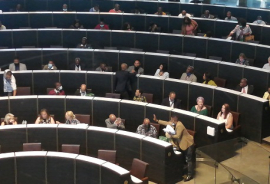
Not having a coalition is not a legal trigger for the dissolution of councils not constituted by the deadline of 23 November, following the 2021 Local Government Elections (LGE), an expert says.
However, as the deadline looms for hung municipal councils, political parties not reaching agreements could ultimately see councils dissolved.
The warning has been fired by the University of the Western Cape’s Dullah Omar Institute in a framework for coalitions in local government document it prepared for the South African Local Government Association. The framework was published on 4 November, the day on which the results of the 2021 election results were announced by the Electoral Commission of South Africa (IEC).
Municipalities are constituted according to the Municipal Structures Act.
Speaking to SAnews, Dullah Omar Institute director, Professor Jaap de Visser, said while the law was not the decisive factor in the success or failure of a coalition, it was important as it determined the parameters within which coalition partners can practice their coalition politics.
“Hung councils [determine] how they solve their predicament. Obviously it has to be done within the parameters of the law. There are laws that apply as to how you elect office bearers and how you run a municipality, so all of those apply. There’s a limit of political discretion of the politicians involved. There are no specific rules that guide councils on how they approach coalition agreements.”
The coalition framework document sets out the legal parameters within which such council could be constituted. It also gives advice, which while not legal, on good practice that could be pursued. After election results are declared, councils have 14 days to constitute.
However, de Visser said should this not happen, “it did automatically mean that an MEC for Cooperative Governance and Traditional Affairs (Cogta) could declare by-elections for the affected council”.
“The law says they (councillors) must have their first council meeting within 14 days. The first thing is that the municipal manager presides over the election of the meeting,” he said. “They elect the speaker and then the speaker takes over the reins and then the mayor and other office bearers are elected.”
He said if there was no political agreement, the meeting could still commence and “go to a vote and it all then becomes unpredictable”.
De Visser said the Institute was advising councils not ready to constitute – due to no political agreements – to still hold the initial meeting but adjourn to a later date.
This, he said, would give the respective coalition partners more time to negotiate.
“They will then come back with a clear picture of who carries the majority vote in terms of speaker and mayor,” he said.
However, he warns that this cannot take too long.
“Councils do need to meet and they do need to take decisions otherwise the municipality grinds to a halt,” said De Visser.
This was the case in the Nquthu Local Municipality in the north of KwaZulu-Natal after the 2016 Local Government Elections when parties could not reach an agreement. After numerous failed attempts, the council was ultimately dissolved in February 2017 and by-elections had to be held to end the stalemate.
Dissolutions, he said, only happened for two reasons.
“The first was when a council dissolves itself by two thirds majority. It has never happened before, but it is possible. They basically says ‘we give up’ and the IEC will then have to hold a by-election for the council. The other option: if it (council) becomes just dysfunctional; council just does not meet [over] prolonged periods of time, service delivery suffers and you get the usual scenario of a long dysfunctional council,” he said.
It is at this point that the provincial Cogta MEC council dissolve the respective council, he said. – SAnews.gov.za


